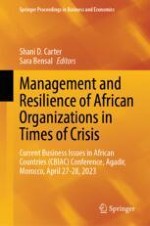Businesses in African countries continued to face crises due to COVID-19, supply chain, and climate change. Governments can take steps to increase businesses’ resilience by supporting and promoting sustainable development. In turn, businesses can increase their resilience by promoting the resilience of their employees. This book explores the current state of management and resilience in African nations and discusses issues that revolve around its reciprocal impact on global business, government, and society. Featuring select papers from the 4th Annual Current Business Issue in African Countries (CBIAC) Conference held in Agadir, Morocco in 2023, this book focuses on the synergies between climate change, supply chain and sustainable development, particularly post pandemic featuring content from business and NGO leaders, faculty, and students.
The impetus of the CBIAC conference was the discussions held at the United Nations Conference on Trade and Development (UNCTAD) held in Nairobi, Keyna in July 2016 and in Bridgetown, Barbados, and Geneva in October. The goal of the conference is to create long-term collaborative relationships between business leaders, faculty, researchers, students, and community members from different African nations.
